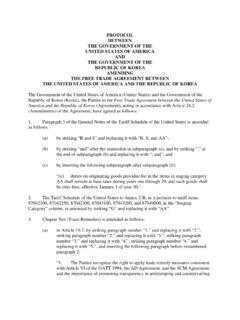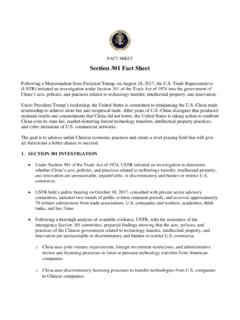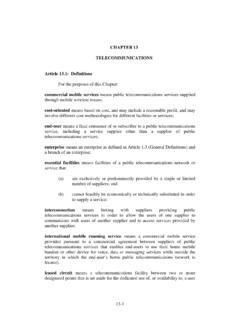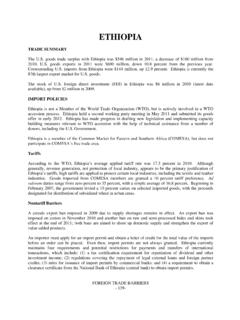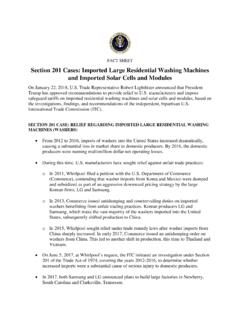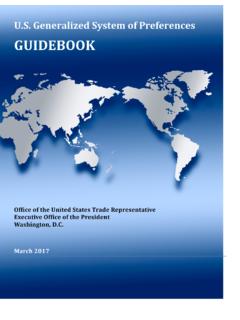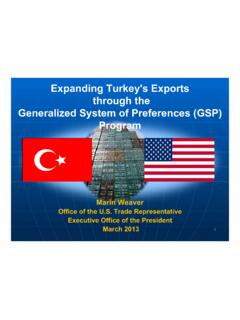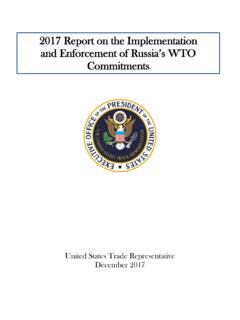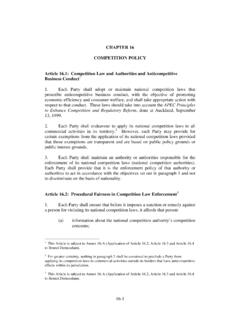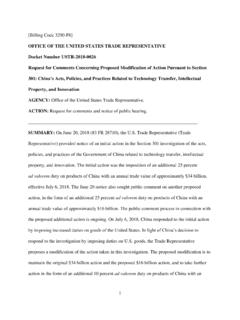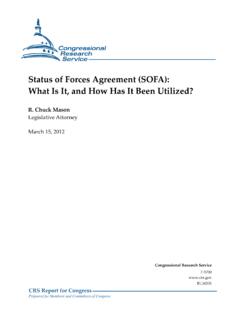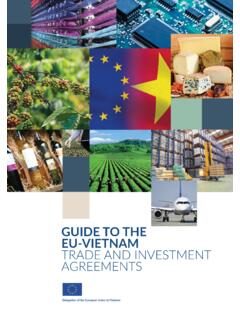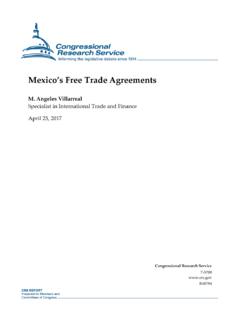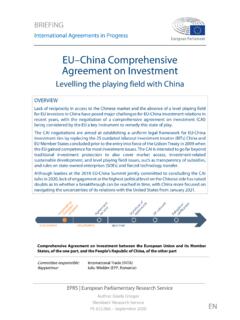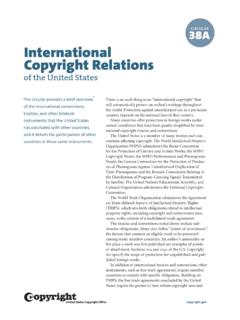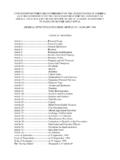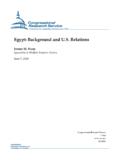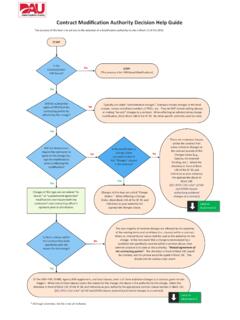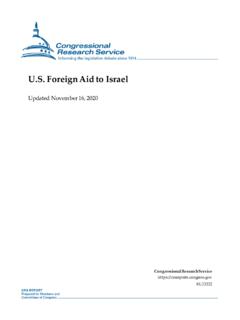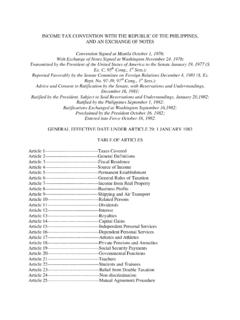Transcription of ECONOMIC AND TRADE AGREEMENT BETWEEN THE …
1 ECONOMIC AND TRADE AGREEMENT BETWEEN THE GOVERNMENT OF THE UNITED STATES OF AMERICA AND THE GOVERNMENT OF THE PEOPLE S REPUBLIC OF CHINA PREAMBLE The Government of the United States of America and the Government of the People s Republic of China (collectively the Parties ), RECOGNIZING the importance of their bilateral ECONOMIC and TRADE relationship; REALIZING that it is in the interests of both countries that TRADE grow and that there is adherence to international norms so as to promote market-based outcomes; CONVINCED of the benefits of contributing to the harmonious development and expansion of world TRADE and providing a catalyst to broader international cooperation; ACKNOWLEDGING the existing TRADE and investment concerns that have been identified by the Parties; and RECOGNIZING the desirability of resolving existing and any future TRADE and investment concerns as constructively and expeditiously as possible, HAVE AGREED as follows: 1-1 CHAPTER 1 INTELLECTUAL PROPERTY Section A: General Obligations The United States recognizes the importance of intellectual property protection.
2 China recognizes the importance of establishing and implementing a comprehensive legal system of intellectual property protection and enforcement as it transforms from a major intellectual property consumer to a major intellectual property producer. China believes that enhancing intellectual property protection and enforcement is in the interest of building an innovative country, growing innovation-driven enterprises, and promoting high quality ECONOMIC growth. Article : China and the United States hereby affirm that they undertake provisions with respect to intellectual property, as set forth in Sections A through K. Article : The Parties shall ensure fair, adequate, and effective protection and enforcement of intellectual property rights. Each Party shall ensure fair and equitable market access to persons of the other Party that rely upon intellectual property protection. Section B: TRADE Secrets and Confidential Business Information The United States emphasizes TRADE secret protection.
3 China regards TRADE secret protection as a core element of optimizing the business environment. The Parties agree to ensure effective protection for TRADE secrets and confidential business information and effective enforcement against the misappropriation of such 1 The Parties agree that the term confidential business information concerns or relates to the TRADE secrets, processes, operations, style of works, or apparatus, or to the production, business transactions, or logistics, customer information, inventories, or amount or source of any income, profits, losses, or expenditures of any person, natural or legal, or other information of commercial value, the disclosure of which is likely to have the effect of causing substantial harm to the competitive position of such person from which the information was obtained. 1-2 Article : Scope of Actors Liable for TRADE Secret Misappropriation 1.
4 The Parties shall ensure that all natural or legal persons can be subject to liability for TRADE secret misappropriation. 2. China shall define operators in TRADE secret misappropriation to include all natural persons, groups of persons, and legal persons. 3. The United States affirms that existing measures afford treatment equivalent to that provided for in this Article. Article : Scope of Prohibited Acts Constituting TRADE Secret Misappropriation 1. The Parties shall ensure that the scope of prohibited acts subject to liability for TRADE secret misappropriation provides full coverage for methods of TRADE secret theft. 2. China shall enumerate additional acts constituting TRADE secret misappropriation, especially: (a) electronic intrusions; (b) breach or inducement of a breach of duty not to disclose information that is secret or intended to be kept secret; and (c) unauthorized disclosure or use that occurs after the acquisition of a TRADE secret under circumstances giving rise to a duty to protect the TRADE secret from disclosure or to limit the use of the TRADE secret.
5 3. China and the United States agree to strengthen cooperation on TRADE secret protection. 4. The United States affirms that existing measures afford treatment equivalent to that provided for in this Article. Article : Burden-Shifting in a Civil Proceeding 1. The Parties shall provide that the burden of production of evidence or burden of proof, as appropriate, shifts to the accused party in a civil judicial proceeding for TRADE secret misappropriation where the holder of a TRADE secret has produced prima facie evidence, including 1-3 circumstantial evidence, of a reasonable indication of TRADE secret misappropriation by the accused party. 2. China shall provide that: (a) the burden of proof or burden of production of evidence, as appropriate, shifts to the accused party to show that it did not misappropriate a TRADE secret once a holder of a TRADE secret produces: (i) evidence that the accused party had access or opportunity to obtain a TRADE secret and the information used by the accused party is materially the same as that TRADE secret; (ii) evidence that a TRADE secret has been or risks being disclosed or used by the accused party; or (iii) other evidence that its TRADE secret(s) were misappropriated by the accused party.
6 And (b) under the circumstance that the right holder provides preliminary evidence that measures were taken to keep the claimed TRADE secret confidential, the burden of proof or burden of production of evidence, as appropriate, shifts to the accused party to show that a TRADE secret identified by a holder is generally known among persons within the circles that normally deal with the kind of information in question or is readily accessible, and therefore is not a TRADE secret. 3. The United States affirms that existing measures afford treatment equivalent to that provided for in this Article. Article : Provisional Measures to Prevent the Use of TRADE Secrets 1. The Parties shall provide for prompt and effective provisional measures to prevent the use of misappropriated TRADE secrets. 2. China shall identify the use or attempted use of claimed TRADE secret information as an urgent situation that provides its judicial authorities the authority to order the grant of a preliminary injunction based on the specific facts and circumstances of a case.
7 3. The United States affirms that existing measures afford treatment equivalent to that provided for in this Article. 1-4 Article : Threshold for Initiating Criminal Enforcement 1. The Parties shall eliminate any requirement that the holder of a TRADE secret establish actual losses as a prerequisite to initiation of a criminal investigation for misappropriation of a TRADE secret. 2. China shall: (a) as an interim step, clarify that great loss as a threshold for criminal enforcement under the TRADE secret provision in the relevant law can be fully shown by remedial costs, such as those incurred to mitigate damage to business operations or planning or to re-secure computer or other systems, and substantially lower all the thresholds for initiating criminal enforcement; and (b) as a subsequent step, eliminate in all applicable measures any requirement that the holder of a TRADE secret establish actual losses as a prerequisite to initiation of a criminal investigation for misappropriation of a TRADE secret.
8 Article : Criminal Procedures and Penalties 1. The Parties shall provide for the application of criminal procedures and penalties to address willful TRADE secret misappropriation. 2. China s criminal procedures and penalties shall at least encompass cases of TRADE secret misappropriation through theft, fraud, physical or electronic intrusion for an unlawful purpose, and the unauthorized or improper use of a computer system in the scope of prohibited acts. 3. The United States affirms that existing measures afford treatment equivalent to that provided for in this Article. Article : Protecting TRADE Secrets and Confidential Business Information from Unauthorized Disclosure by Government Authorities 1. To further strengthen the protection of TRADE secrets, as well as better encourage various enterprises to innovate, China shall prohibit the unauthorized disclosure of undisclosed information, TRADE secrets, or confidential business information by government personnel or third party experts or advisors in any criminal, civil, administrative, or regulatory proceedings 1-5 conducted at either the central or sub-central levels of government in which such information is submitted.
9 2. China shall require administrative agencies and other authorities at all levels to: (a) limit requests for information to no more than necessary for the legitimate exercise of investigative or regulatory authority; (b) limit access to submitted information to only government personnel necessary for the exercise of legitimate investigative or regulatory functions; (c) ensure the security and protection of submitted information; (d) ensure that no third party experts or advisors who compete with the submitter of the information or have any actual or likely financial interest in the result of the investigative or regulatory process have access to such information; (e) establish a process for persons seeking an exemption from disclosure and a mechanism for challenging disclosures to third parties; and (f) provide criminal, civil, and administrative penalties, including monetary fines, the suspension or termination of employment, and, as part of the final measures amending the relevant laws, imprisonment, for the unauthorized disclosure of a TRADE secret or confidential business information that shall deter such unauthorized disclosure.
10 3. The United States affirms that existing measures afford treatment equivalent to that provided for in this Article. Section C: Pharmaceutical-Related Intellectual Property Pharmaceuticals are a matter concerning people s life and health, and there continues to be a need for finding new treatments and cures, such as for cancer, diabetes, hypertension, and stroke, among others. To promote innovation and cooperation in the pharmaceutical sector and to better meet the needs of patients, the Parties shall provide for effective protection and enforcement of pharmaceutical-related intellectual property rights, including patents and undisclosed test or other data submitted as a condition of marketing approval. 1-6 Article : Consideration of Supplemental Data 1. China shall permit pharmaceutical patent applicants to rely on supplemental data to satisfy relevant requirements for patentability, including sufficiency of disclosure and inventive step, during patent examination proceedings, patent review proceedings, and judicial proceedings.
